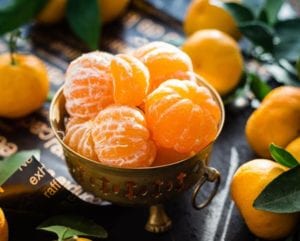Written by Greg Arnold, DC, CSCS. Of the 56 participating dental patients, those who inhaled orange fragrance in the waiting room prior to surgery and in the surgical room during surgery, had significantly lower pulse and breathing rates compared to the control group.
 The one emotion that seems to accompany most people who have dental procedures done is anxiety. This is fueled by a fear that dental treatments are painful and unpleasant procedures, leading dental patients to experience pain often during or after treatment 1. This “dental anxiety” frequently causes an avoidance of treatment 2, resulting in declining oral health 3 and quality of life 4. As a result, “managing dental anxiety should be considered an important aspect of dental practice” 5,6.
The one emotion that seems to accompany most people who have dental procedures done is anxiety. This is fueled by a fear that dental treatments are painful and unpleasant procedures, leading dental patients to experience pain often during or after treatment 1. This “dental anxiety” frequently causes an avoidance of treatment 2, resulting in declining oral health 3 and quality of life 4. As a result, “managing dental anxiety should be considered an important aspect of dental practice” 5,6.
Fortunately, research has started to suggest that ambient orange scent may be a benefit to those undergoing dental procedures. A 2014 study 7 involved 56 patients (31 males, 25 females) aged 15 to 44 undergoing dental surgery to remove an impacted third molar. They were exposed to either an orange fragrance (28 subjects) or no fragrance (28 subjects) before entering the dental chair for the surgical procedure. Regarding the scent exposure, 5 drops of orange essential oil (0.25 milliliters) or placebo was mixed with 5 liters of water and diffused using an electrical dispenser in both the waiting room and the operating room.
Vital signs were taken before sitting in the dental chair, during the procedure, and after the procedure. The researchers chose subjects classified as having “high anxiety levels” based on results of a dental anxiety questionnaire 8.
The researchers noted a significant benefit with ambient orange scent both during and immediately after surgery:
| Orange Scent | No Scent | p-value | ||
|---|---|---|---|---|
| Pulse Rate (beats per minute) | During surgery | 98.57 (7.8% lower than placebo) | 106.89 | 0.02 |
| Immediately after surgery | 95.14 (9.2% lower than placebo) | 104.71 | 0.003 | |
| Breathing rate (breaths/minute) | During surgery | 26.14 (12.9% lower than placebo) | 30 | < 0.001 |
| Immediately after surgery | 27 (9.6% lower than placebo) | 29.85 | < 0.001 |
While they could not give a specific mechanism, the researchers did cite research describing the ability of aromas to stimulate the limbic system, an area of our brain that controls emotion and which can release nerve chemicals which can alter physiological functions like breathing and heart rate (9).
For the researchers, “ambient orange fragrance can be helpful in reducing dental anxiety during surgical removal of an impacted mandibular third molar” and that “Future randomized clinical trials with a larger selection of patients are recommended to validate the results of our study.”
Source: Hasheminia, Dariush, Mahmood Reza Kalantar Motamedi, Fatemeh Karimi Ahmadabadi, Hadi Hashemzehi, and Abbas Haghighat. “Can ambient orange fragrance reduce patient anxiety during surgical removal of impacted mandibular third molars?.” Journal of Oral and Maxillofacial Surgery 72, no. 9 (2014): 1671-1676.
© 2014 Published by Elsevier Inc.
Posted October 3, 2016.
Greg Arnold is a Chiropractic Physician practicing in Hauppauge, NY. You can contact Dr. Arnold directly by emailing him at PitchingDoc@msn.com or visiting his web site at www.PitchingDoc.com.
References:
- Berge TI. Nitrous oxide in dental surgery. Best Practice & Research Clinical Anaesthesiology. 2001;15(3):477-489.
- Meng X, Heft MW, Bradley MM, Lang PJ. Effect of fear on dental utilization behaviors and oral health outcome. Community Dent Oral Epidemiol. 2007;35(4):292-301.
- Hmud R, Walsh LJ. Dental anxiety: causes, complications and management approaches. J Minim Interv Dent. 2009;2(1):67-78.
- Mehrstedt M, John MT, Tonnies S, Micheelis W. Oral health-related quality of life in patients with dental anxiety. Community Dent Oral Epidemiol. 2007;35(5):357-363.
- Bare LC, Dundes L. Strategies for combating dental anxiety. Journal of dental education. 2004;68(11):1172-1177.
- Pawlicki RE. Psychological/behavioral techniques in managing pain and anxiety in the dental patient. Anesthesia progress. 1991;38(4-5):120.
- Kyle G. Evaluating the effectiveness of aromatherapy in reducing levels of anxiety in palliative care patients: results of a pilot study. Complement Ther Clin Pract. 2006;12(2):148-155.
- Hasheminia D, Kalantar Motamedi MR, Karimi Ahmadabadi F, Hashemzehi H, Haghighat A. Can ambient orange fragrance reduce patient anxiety during surgical removal of impacted mandibular third molars? Journal of oral and maxillofacial surgery : official journal of the American Association of Oral and Maxillofacial Surgeons. 2014;72(9):1671-1676.
